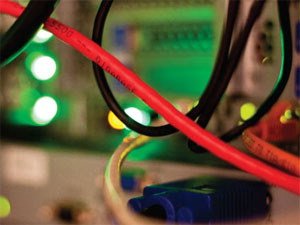Digital Technology Center makes progress through partnerships

Expertise where it’s needed most
Part of the College of Science and Engineering, the DTC launched in 1997 to support the region’s digital technology industry. Fifteen years later, the center continues to serve as a point of entry for business, industry and government sectors seeking U of M partners.
In response to today’s biggest technology challenges, some of the center’s current research areas include wireless communications and networking, robotics and computer vision, signal processing, graphics and visualization, and digital storage. The DTC laboratories — with specialized facilities for computational science, distributed robotics, graphics and visualization, and more — offer researchers the tools they need to make real progress.
At the same time, potential industry partners may come to the DTC to encourage research in new or emerging areas. This includes small businesses that want to partner with faculty in bringing specific technology products to market.
The DTC also reaches out to the business and secondary education community with online seminars, workshops, tours and research lectures.
Even if a technology challenge falls outside of the center’s focus areas, Devor says he and his colleagues often serve as problem-solving liaisons. “If we don’t have the expertise, we know how to find it.”
Bringing together the best and brightest
The DTC also offers industry partners, sometimes competitors, the ability to pool research funds to investigate common technology issues in a non-competitive environment. For example, with the help of the National Science Foundation, the center has developed and supported university-industry consortia around intelligent digital storage and robotics applied to safety, security and rescue.
It helps that in recent years, professor Georgios Giannakis, the center’s director and a well-known expert in wireless communications and networking, has made a special effort to strengthen interdisciplinary research teams at the DTC. This focused effort is important because more and more industry and government initiatives require knowledge from across disciplines.
Devor says an invasive fish tracking project, led by associate professor Volkan Isler, offers a great case in point: When studying the migration of Asian carp in lakes and ponds with autonomous vehicles, everyone from environmental to robotics experts are putting their heads together.
“Big data” is another challenge that requires working together across disciplines, and it’s an area the DTC expects to tackle more and more in the near future. The challenge results from the fact that “there are so many sources of data being collected,” says Devor, yet nothing is being deleted.
Whether it’s petabytes of Twitter data or hospital lab tests, “there’s the feeling that we have a tremendous amount of data but we haven’t figured out how to optimize the extraction of information.” The issue has become a priority for the federal government because it affects everything from security to health care.
Is your company looking for research expertise in the ever-changing field of digital technology? Contact Cory Devor (cdevor@gmail.com or 612-625-1716) to get started.
Republished with permission from Business @ the U of M, a publication of the Office of the Vice President for Research.
